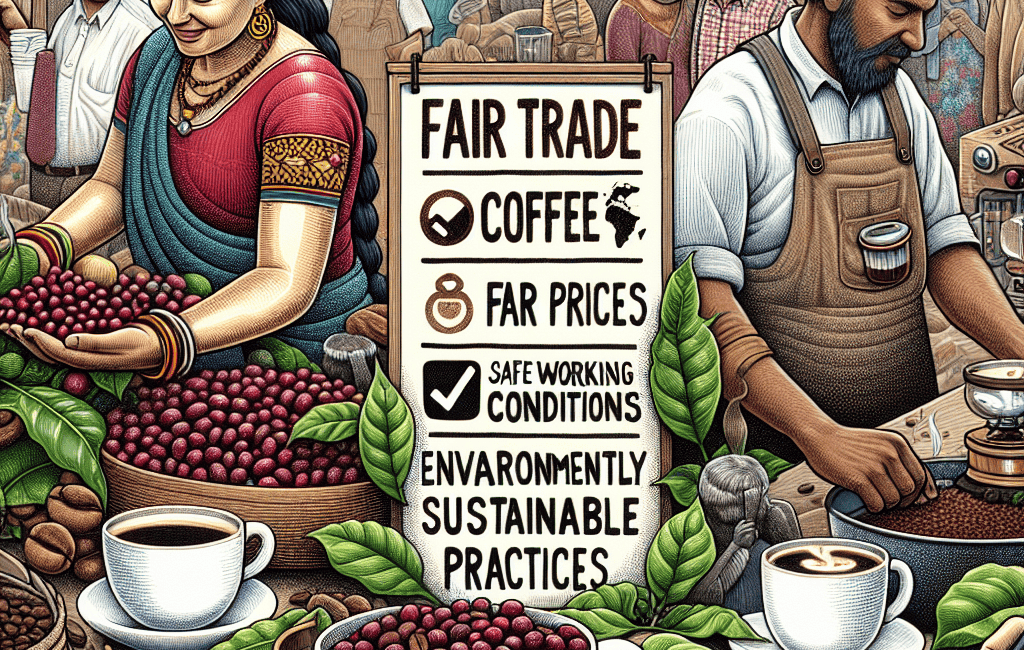
Coffee and Social Justice: Fair Trade and Ethical Practices
Coffee is more than just a beverage; it’s a cultural phenomenon and a global industry that touches the lives of millions. However, behind every cup of coffee lies a complex web of social, economic, and environmental issues. This blog post explores the intersection of coffee and social justice, focusing on Fair Trade and ethical practices that aim to create a more equitable coffee industry.
The Global Coffee Industry: An Overview
With over 2.25 billion cups consumed daily, coffee is one of the most popular drinks worldwide. It’s not just a source of caffeine; it’s a livelihood for millions of farmers, workers, and their families in developing countries. However, the reality for many coffee producers is far from fair. Farmers often receive a fraction of the price consumers pay for their coffee, leading to a cycle of poverty.
Understanding Fair Trade
Fair Trade is a movement that advocates for fair wages, safe working conditions, and sustainable practices. It aims to empower farmers and workers, ensuring they receive a living wage for their products and have better access to markets. The Fair Trade certification provides guidelines that help consumers identify products that meet these ethical standards.
The Principles of Fair Trade
The Fair Trade movement is built on several core principles:
- Fair Prices: Farmers receive a minimum price, which covers their production costs and allows for a sustainable livelihood.
- Direct Trade: Fair Trade promotes direct connections between producers and consumers, reducing the number of intermediaries.
- Community Development: Fair Trade premiums—additional funds paid to cooperatives—are invested in community projects like education, healthcare, and infrastructure.
- Environmental Sustainability: Fair Trade encourages sustainable farming practices that protect the environment and biodiversity.
- Empowerment: Fair Trade supports gender equality and the empowerment of marginalized groups, ensuring that all voices are heard.
The Impact of Fair Trade on Coffee Farmers
Fair Trade has made significant strides in improving the lives of coffee farmers. By establishing fair prices and providing support, it helps farmers achieve financial stability. Studies indicate that Fair Trade certified farmers earn about 20-30% more than those who are not part of the system.
Moreover, Fair Trade practices help farmers to invest in their communities. For instance, the additional income from Fair Trade premiums has led to:
- Better access to education and healthcare.
- Improved infrastructure, such as roads and water supply.
- Increased women’s participation in the workforce and leadership roles.
Challenges Facing Fair Trade
Despite its successes, Fair Trade is not without challenges. Some of the key issues include:
- Market Saturation: As more products receive Fair Trade certification, it can dilute the impact of the label.
- Certification Costs: Small-scale farmers often struggle with the costs of certification, which can be a barrier to entry.
- Limited Reach: Not all coffee is Fair Trade certified, and many consumers may not have access to these products.
Beyond Fair Trade: Other Ethical Practices
While Fair Trade is a significant step toward social justice in the coffee industry, other ethical practices also contribute to a more equitable system:
- Direct Trade: This model eliminates middlemen by allowing roasters to purchase coffee directly from farmers, ensuring better prices for producers.
- Organic Certification: Organic coffee farming practices contribute to environmental sustainability and promote healthier ecosystems.
- Cooperatives: Farmer cooperatives empower producers by giving them collective bargaining power and access to resources.
How Consumers Can Make a Difference
As consumers, we hold significant power in shaping the coffee industry. Here are ways to make a positive impact:
- Choose Fair Trade: When shopping for coffee, look for Fair Trade certified products to support equitable practices.
- Research Brands: Investigate brands’ sourcing practices and support those committed to ethical standards.
- Spread Awareness: Share information about Fair Trade and ethical coffee practices within your community.
- Reduce Waste: Consider using reusable coffee cups and reducing waste to support sustainability.
The Future of Coffee and Social Justice
As the coffee industry evolves, there is hope for a more just and equitable future. Growing awareness of social justice issues has prompted many consumers to demand transparency and ethical practices. Additionally, innovative models and technologies are emerging to support farmers, improve supply chains, and enhance sustainability.
Organizations and initiatives focused on social justice in the coffee industry continue to grow, fostering a deeper connection between consumers and producers. By supporting Fair Trade and ethical practices, we can all play a role in promoting a fairer coffee economy.
Conclusion
In conclusion, the journey of coffee from bean to cup is interwoven with stories of struggle, resilience, and hope. By choosing Fair Trade and supporting ethical practices, we can contribute to a more equitable world. So, the next time you savor your morning brew, consider the impact of your choices and the power of your cup.


